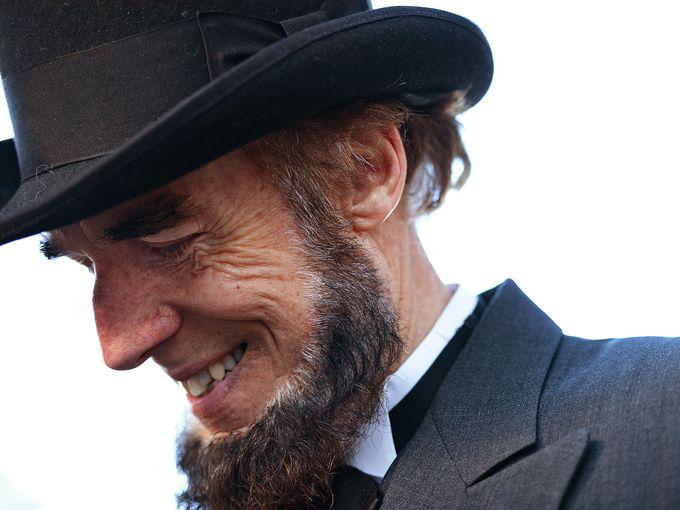
President Lincoln's speech has gained in prominence since it was delivered.

The site of one of the bloodiest battles of the Civil War was host to a solemn tribute to history Tuesday as thousands gathered in Gettysburg, Pa., to mark the 150th anniversary of Abraham Lincoln's Gettysburg Address.
Lincoln's iconic speech came four months after a fierce, three-day battle in July 1863 left more than 7,000 soldiers dead and 40,000 wounded. Rolling farm fields were turned into graveyards, and Lincoln's visit was part of the ceremonies dedicating the Soldiers' National Cemetery. The area remains home to Gettysburg National Cemetery and Gettysburg National Military Park.
STORY: 5 things to know about Gettysburg Address
The event Tuesday on a sunny but chilly morning included naturalization ceremonies led by Supreme Court Justice Antonin Scalia for 16 new citizens. Scalia, Interior Secretary Sally Jewell, Sen. Bob Casey, D-Pa., and National Park Service Director John Jarvis were among those presenting memorial wreaths.
Jewell drew applause for promising to keep her speech as short as Lincoln's two-minute oration, adding that his words "remind us of what it means to be an American."
"Lincoln's words stand at the vortex of our national consciousness," Jewell told the crowd. "Hearing them, we are reminded of the sacrifice of so many for freedom."
Casey said the nation must recommit itself to unfinished business. "The cause then was the Civil War and the future of the country," Casey said. Today's causes, he said, must include "increased devotion to our veterans."
In 1963, Martin Luther King, kicking off his "I Have a Dream" speech before a crowd of 250,000 at the Lincoln Memorial in Washington, noted that Lincoln's Emancipation Proclamation took effect "five score years ago."
The phrase invoked the Gettysburg Address, whose words were etched into the interior of the monument just a few steps behind the civil rights icon.
The address includes the line, "The world will little note, nor long remember, what we say here" — and that may have rung true back then. It was ridiculed at first in some prominent quarters: The Chicago Times, for one, cited "silly, flat and dish-watery utterances."
The Patriot-News of Harrisburg, about 35 miles northeast of Gettysburg, was one of the early detractors. Last week, the newspaper apologized:
Seven score and ten years ago, the forefathers of this media institution brought forth to its audience a judgment so flawed, so tainted by hubris, so lacking in the perspective history would bring, that it cannot remain unaddressed in our archives.
We write today in reconsideration of "The Gettysburg Address," delivered by then-President Abraham Lincoln in the midst of the greatest conflict seen on American soil. Our predecessors, perhaps under the influence of partisanship, or of strong drink, as was common in the profession at the time, called President Lincoln's words "silly remarks," deserving "a veil of oblivion," apparently believing it an indifferent and altogether ordinary message, unremarkable in eloquence and uninspiring in its brevity.

Tom Scott portrays Abraham Lincoln. The Gettysburg Address highlighted principles of democracy, human equality and freedom.



















